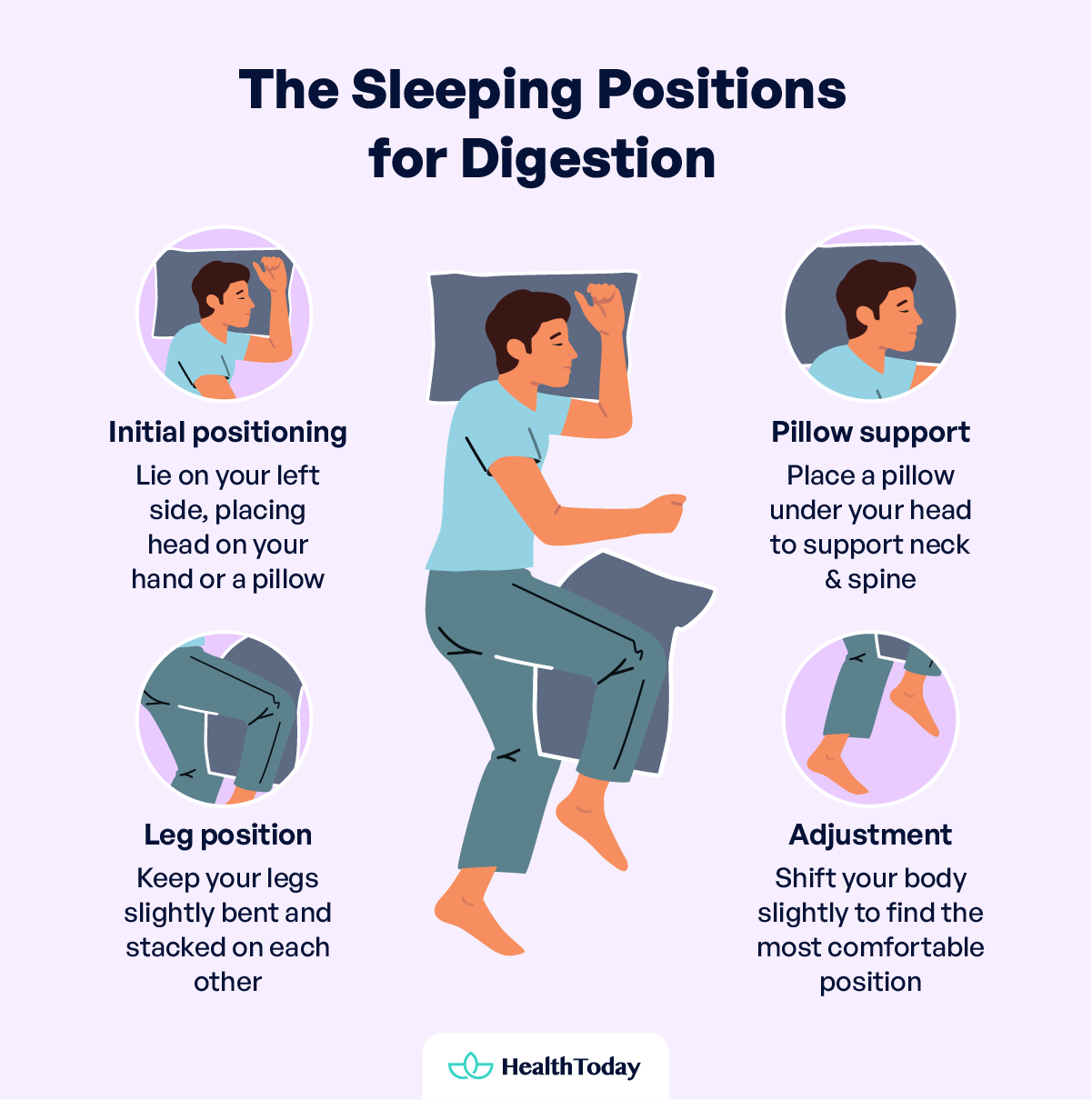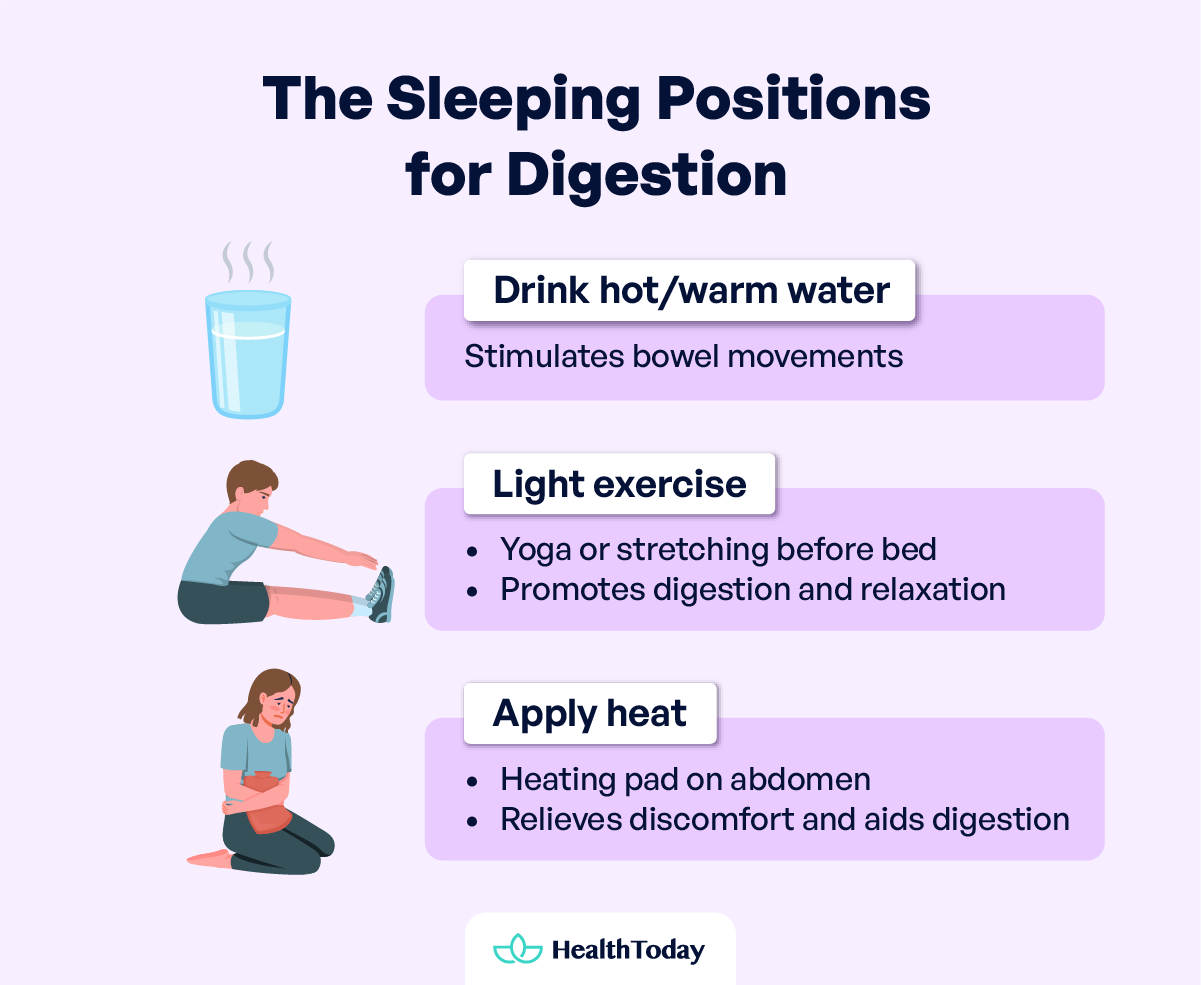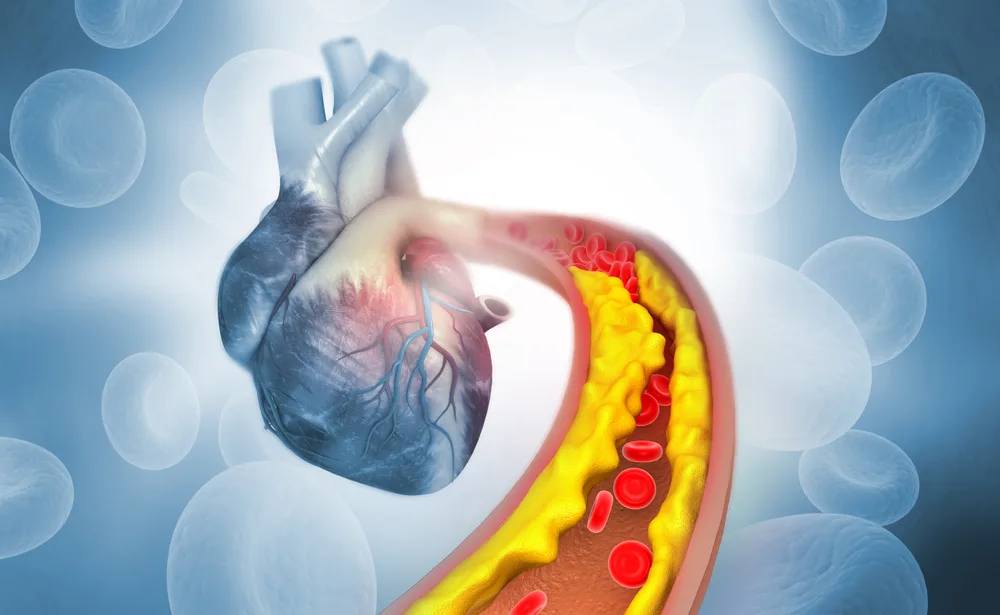Table of Contents
Your sleeping position can significantly alleviate symptoms when you have digestive issues. However, it’s also important to avoid postures that might worsen your condition.
In this article, we will explore the best sleeping positions for the three most common digestive problems: acid reflux, constipation, and stomach pain. Additionally, we’ll highlight the key don’ts for sleeping with these issues. Let’s dive in!
Why it matters
Digestion is a complex process involving multiple organs and hormones. When you eat, food travels from your mouth through the esophagus and into your stomach, where stomach acids break it down.
It then moves into the small intestine, where nutrients are absorbed. And finally, it reaches the large intestine, where water is absorbed, and waste is prepared for elimination (1).
Although this process might seem challenging for your mind and body, it’s done seamlessly without much conscious effort.
However, if you have digestive issues, it’s still important to be aware of factors that might improve or worsen your symptoms and lend your body a helping hand. Sleep is considered both a disruptor and supporter of digestion.
Insufficient sleep can be one of the many causes of gut disturbances. Getting adequate sleep can support digestion and other body processes (2, 3). So, understanding which side to lie on for digestion can significantly impact your overall health.

Which side should you sleep on for digestion?


A meta-analysis of several studies showed that people who slept on their left side had reduced Gastroesophageal reflux disease (GERD) symptoms, while those who slept on their right side or back experienced no relief (4). This analysis answers the question of which side to lie on for digestion and confirms that sleeping on your left instead of your right can help digestion.
You can sleep comfortably on your left side using the following steps:
- Initial positioning: Lie down on your back and gently roll onto your left side. Use your left arm as a pillow, bending it at the elbow and placing your head comfortably on your hand or a pillow.
- Leg position: Keep your legs slightly bent and stacked on each other. You can also place a semi-firm pillow between your knees to provide additional support and alignment for your spine.
- Pillow support: Place a pillow under your head to support your neck and ensure proper alignment with your spine. Choose a pillow that is not too high or too flat, providing just the right angle of cushioning for your head.
- Adjustment: Once in the desired position, make any necessary adjustments to ensure you feel relaxed and settled. You may need to shift your body slightly to find the most comfortable position for sleeping on your left side.
When you are ready, take a few deep breaths and allow your body to relax fully in the left-side sleeping position. Focus on releasing any muscle tension and drift off into a restful sleep.
The sleeping positions to relieve gas
Intestinal gas can make your belly feel bloated and uncomfortable. It’s often caused by swallowing air while eating, drinking, or consuming certain foods that can’t be properly digested (5).
While there’s no “one-size-fits-all” solution for relieving gas, certain sleeping positions may help manage your symptoms and promote better gas movement through the intestines. Below is a list of the best sleeping positions to relieve gas naturally.
Side sleeping
To assume this position, lie comfortably on your left side with your left arm and shoulder on the bed. Keep your knees slightly bent to aid the passage of gas.
Fetal position
Curling up in the fetal position can help relax your abdominal muscles and alleviate gas discomfort. It’s a simple posture that can be done on either side without implementing any complex technique. To adopt this position, lie on your side and curl up, forming a C shape with your body, while drawing your knees toward your chest.
Elevated head
Commonly used for respiratory illnesses involving nasal congestion, this position incorporates propping pillows under your head and midsection to slightly elevate the upper body while sleeping on your back. The elevation helps prevent acid reflux and reduces the possibility of swallowing air, which can contribute to gas buildup in the stomach.
Prone position
While this position may not directly alleviate gas, it can help relieve pressure on your abdomen and provide relaxation. Simply lie on your stomach with your head turned to one side.
How should you sleep when constipated?
Constipation is characterized by hard, dry stools that are difficult to pass, resulting in infrequent bowel movements. This regularly leads to discomfort, gas, and abdominal bloating, making it inconvenient to find a comfortable resting position (6).
Studies suggest that insomnia could be one of the risk factors for constipation (7), so it is preferable to do whatever you can to ensure good sleep habits. Here are some methods you can try before bed to get a better night’s rest when you’re constipated:
- Hot/warm water: Sipping on hot or warm water before bed can help stimulate bowel movements, aiding the movement of stagnant stools and relieving constipation (8).
- Light exercise: Incorporating light exercise, such as yoga or stretching, into your pre-sleep routine can ease constipation and insomnia. These activities stimulate intestinal movement, reduce stress, and relax your muscles, making it easier for your body to fall asleep without experiencing symptoms of constipation. It is optimal to do 10 minutes of light exercise, 1–2 hours before bed (9, 10, 11, 12).
- Applying heat: Placing a heating pad on your tummy can help relieve constipation. Direct warmth on the abdomen relaxes intestinal muscles, improves blood circulation, and supports peristalsis—an involuntary movement of muscles that moves food and fluids through the digestive tract (13, 14).
What side should you lie on if your stomach hurts?


Stomach pain can be hard to handle any day, let alone at night. Whether the pain stems from indigestion, gas, acid reflux, or a bad batch of cookies, it can put a damper on a good night’s rest.
But all is not lost, as there are ways you can still get some shut-eye despite the ache. So, what side should you lie on if your stomach hurts? One recommended position is to lie on your left side.
This often helps relieve the common causes of tummy aches, which research shows come from digestive issues like trapped wind, indigestion, and constipation (15). Lying on your left side aids digestion by using gravity to move food through your digestive tract, which can alleviate stomach discomfort (16, 17).
While science does support sleeping on the left side for a tummy ache, listening to your body and finding what works best for you is also essential. Experiment with positions and pillow arrangements to see what provides the most relief in your case.
The worst sleeping positions for digestion
Sleeping on your right side is often frowned upon if you want to have better digestion. Research shows that right-side sleeping aggravates digestive issues by relaxing the lower esophageal sphincter, allowing stomach acid to back up into the esophagus, potentially leading to acid reflux and heartburn (18).
Other positions that are also discouraged include lying flat on your back, sleeping on your stomach, and curling up in a ball. While some of these can help relieve gas, they aren’t ideal for digestion due to their potential effects on stomach acid (19).
It’s important to note that there isn’t strong scientific evidence supporting this idea. While these positions aren’t necessarily harmful to digestion, they certainly don’t aid it and may sometimes complicate digestion.
How to support digestion before bed
The correct sleep position can help digestion, but it’s not the only way to keep our sleep and gut cycles happy.
Avoiding heavy, spicy, or acidic foods close to bedtime is crucial. Instead, choose lighter meals rich in fiber and nutrients a few hours before bed. Consider elevating your upper body slightly with extra pillows to reduce acid reflux and promote better digestion while you sleep (20). Combining mindful eating habits with elevated sleeping positions can optimize your nighttime routine to support healthy digestion and overall well-being.



What side should I sleep on when my stomach is full?
When full, sleeping on your left side can help prevent acid reflux and heartburn by allowing gravity to keep stomach contents down. It can also aid digestion and promote overall comfort.
Why does lying on the left side help relieve gas?
Various factors cause gas, including digestive issues like acid reflux. Research shows that the likelihood of acid reflux is much higher when you sleep on your right side, which is why the left side is often recommended (21).
Why can I only sleep on my left side?
Some people find sleeping on their left side more comfortable due to its potential benefits for digestion and acid reflux. Personal preference, comfort, and individual body anatomy may also affect your sleep position preference.
How do you improve digestion while sleeping?
To improve your digestion, avoid eating large, heavy meals close to bedtime, and practice relaxation techniques and good sleep hygiene to ensure restful sleep.
Why is sleeping on your left side better than on your right?
Sleeping on your left side is recommended because it positively affects digestive health and reduces digestion discomfort (22). Prolonged symptoms of digestive diseases and inflammatory GI disorders often lead to shorter, poor-quality sleep (23). Sleeping on your left side can alleviate these symptoms and improve sleep quality.
Summary
Optimal digestion isn’t solely determined by diet—your sleep position also plays a role. As for which side to lie on for digestion, research suggests sleeping on your left side is beneficial.
This position can enhance digestion by reducing acid reflux and supporting the flow of digestive fluids through the stomach and intestines. In contrast, sleeping on your right side can aggravate digestion by allowing stomach acid to escape into the esophagus, leading to acid reflux.
So, the next time you crawl into bed, opt for your left side. Pairing this position with mindful eating habits and relaxation techniques further enhances the benefits, leading to a healthier gut and improved sleep quality.

















Comments
0